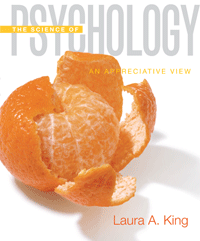| Archetypes | The name Jung gave to the emotionally laden ideas and images that have rich and symbolic meaning for all people.
|
 |
 |
 |
| big five factors of personality | The "supertraits" that are thought to describe the main dimensions of personality—specifically, neuroticism (emotional instability), extraversion, openness to experience, agreeableness, and conscientiousness.
|
 |
 |
 |
| cognitive affective processing systems (CAPS) | According to Mischel, a set of interconnected cognitive systems through which an individual's thoughts and emotions about self and the world become linked together in ways that matter to behavior.
|
 |
 |
 |
| collective unconscious | Jung's term for the impersonal, deepest layer of the unconscious mind, shared by all human beings because of their common ancestral past.
|
 |
 |
 |
| defense mechanisms | The ego's protective methods for reducing anxiety by unconsciously distorting reality.
|
 |
 |
 |
| Ego | The Freudian structure of personality that deals with the demands of reality.
|
 |
 |
 |
| empirically keyed test | A type of test that presents a host of questionnaire items to groups of people who are already known to differ in some central way (such as individuals with a psychological disorder versus mentally healthy individuals).
|
 |
 |
 |
| face validity | The extent to which a test item appears to be valid to those who are completing it.
|
 |
 |
 |
| Hardiness | A trait characterized by a sense of commitment and control and a perception of problems as challenges rather than threats.
|
 |
 |
 |
| humanistic perspectives | Views of personality that stress the person's capacity for personal growth, freedom to choose a destiny, and positive qualities.
|
 |
 |
 |
| Id | The Freudian structure of personality that consists of unconscious drives and is the individual's reservoir of psychic energy.
|
 |
 |
 |
| individual psychology | The term for Adler's approach, which views people as motivated by purposes and goals and as striving for perfection over pleasure.
|
 |
 |
 |
| Minnesota Multiphasic Personality Inventory (MMPI) | The most widely used and researched empirically keyed self-report personality test.
|
 |
 |
 |
| Oedipus complex | In Freud's theory, a young boy's intense desire to replace his father and enjoy the affections of his mother.
|
 |
 |
 |
| Personality | A pattern of enduring, distinctive thoughts, emotions, and behaviors that characterize the way an individual adapts to the world.
|
 |
 |
 |
| personological and life story perspectives | Approaches to personality emphasizing that the way to understand the person is to focus on his or her life history and life story—aspects that distinguish that individual from all others.
|
 |
 |
 |
| projective test | Personality assessment tool that presents individuals with an ambiguous stimulus and then asks them to describe it or tell a story about it; in other words, to project their own meaning onto it.
|
 |
 |
 |
| psychodynamic perspectives | Views of personality as primarily unconscious (that is, beyond awareness) and as developing in stages. Most psychoanalytic perspectives emphasize that early experiences with parents play a role in sculpting personality.
|
 |
 |
 |
| Rorschach inkblot test | A widely used projective test that uses an individual's perception of inkblots to determine his or her personality.
|
 |
 |
 |
| self-concept | A central theme in Rogers's and other humanists' views; self-concept refers to individuals' overall perceptions and assessments of their abilities, behavior, and personalities.
|
 |
 |
 |
| self-efficacy | The belief that one can master a situation and produce positive outcomes.
|
 |
 |
 |
| self-report test | Also called an objective test or inventory, a type of test that directly asks people whether specific items (usually true/false or agree/disagree) describe their personality traits.
|
 |
 |
 |
| social cognitive perspectives | Approaches to personality emphasizing conscious awareness, beliefs, expectations, and goals; social cognitive psychologists explore the person's ability to reason; to think about the past, present, and future; and to reflect on the self.
|
 |
 |
 |
| Superego | The Freudian structure of personality harshly judges the morality of our behavior.
|
 |
 |
 |
| Thematic Apperception Test (TAT) | A projective test designed to elicit stories that reveal something about an individual's personality.
|
 |
 |
 |
| trait | An enduring personality characteristic that tends to lead to certain behaviors.
|
 |
 |
 |
| trait theories | Theories stating that personality consists of broad, enduring dispositions (traits) that tend to lead to characteristic responses.
|
 |
 |
 |
| Type A behavior pattern | A cluster of characteristics—such as being excessively competitive, hard-driven, impatient, and hostile—related to the incidence of heart disease.
|
 |
 |
 |
| Type B behavior pattern | A cluster of characteristics—such as being relaxed and easygoing—related to good health.
|
 |
 |
 |
| unconditional positive regard | Rogers's term for accepting, valuing, and being positive toward another person regardless of the person's behavior.
|





